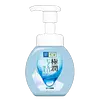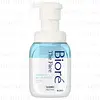What's inside
What's inside
 Key Ingredients
Key Ingredients

No key ingredients
 Benefits
Benefits

 Concerns
Concerns

 Ingredients Side-by-side
Ingredients Side-by-side

Water
Skin ConditioningButylene Glycol
HumectantDisodium Cocoyl Glutamate
CleansingPEG-8
HumectantCocamidopropyl Betaine
CleansingCocamide DEA
EmulsifyingPEG-80 Sorbitan Laurate
Glycerin
HumectantSorbitol
HumectantSodium Taurine Cocoyl Methyltaurate
CleansingSodium Acetylated Hyaluronate
HumectantHydroxypropyltrimonium Hyaluronate
Petrolatum
EmollientCitric Acid
BufferingPolyquaternium-7
Disodium EDTA
BHT
AntioxidantMethylparaben
PreservativeWater, Butylene Glycol, Disodium Cocoyl Glutamate, PEG-8, Cocamidopropyl Betaine, Cocamide DEA, PEG-80 Sorbitan Laurate, Glycerin, Sorbitol, Sodium Taurine Cocoyl Methyltaurate, Sodium Acetylated Hyaluronate, Hydroxypropyltrimonium Hyaluronate, Petrolatum, Citric Acid, Polyquaternium-7, Disodium EDTA, BHT, Methylparaben
Water
Skin ConditioningPropylene Glycol
HumectantPEG-150
HumectantGlycerin
HumectantLauric Acid
CleansingLaureth-6 Carboxylic Acid
CleansingMyristic Acid
CleansingArginine
MaskingLauryl Hydroxysultaine
CleansingPotassium Hydroxide
BufferingDecyl Glucoside
CleansingLaureth-4 Carboxylic Acid
Palmitic Acid
EmollientPolyquaternium-39
Acrylates Copolymer
Ethylhexylglycerin
Skin ConditioningDisodium EDTA
Phenoxyethanol
PreservativeParfum
MaskingWater, Propylene Glycol, PEG-150, Glycerin, Lauric Acid, Laureth-6 Carboxylic Acid, Myristic Acid, Arginine, Lauryl Hydroxysultaine, Potassium Hydroxide, Decyl Glucoside, Laureth-4 Carboxylic Acid, Palmitic Acid, Polyquaternium-39, Acrylates Copolymer, Ethylhexylglycerin, Disodium EDTA, Phenoxyethanol, Parfum
Ingredients Explained
These ingredients are found in both products.
Ingredients higher up in an ingredient list are typically present in a larger amount.
Disodium EDTA plays a role in making products more stable by aiding other preservatives.
It is a chelating agent, meaning it neutralizes metal ions that may be found in a product.
Disodium EDTA is a salt of edetic acid and is found to be safe in cosmetic ingredients.
Learn more about Disodium EDTAGlycerin is already naturally found in your skin. It helps moisturize and protect your skin.
A study from 2016 found glycerin to be more effective as a humectant than AHAs and hyaluronic acid.
As a humectant, it helps the skin stay hydrated by pulling moisture to your skin. The low molecular weight of glycerin allows it to pull moisture into the deeper layers of your skin.
Hydrated skin improves your skin barrier; Your skin barrier helps protect against irritants and bacteria.
Glycerin has also been found to have antimicrobial and antiviral properties. Due to these properties, glycerin is often used in wound and burn treatments.
In cosmetics, glycerin is usually derived from plants such as soybean or palm. However, it can also be sourced from animals, such as tallow or animal fat.
This ingredient is organic, colorless, odorless, and non-toxic.
Glycerin is the name for this ingredient in American English. British English uses Glycerol/Glycerine.
Learn more about GlycerinWater. It's the most common cosmetic ingredient of all. You'll usually see it at the top of ingredient lists, meaning that it makes up the largest part of the product.
So why is it so popular? Water most often acts as a solvent - this means that it helps dissolve other ingredients into the formulation.
You'll also recognize water as that liquid we all need to stay alive. If you see this, drink a glass of water. Stay hydrated!
Learn more about Water